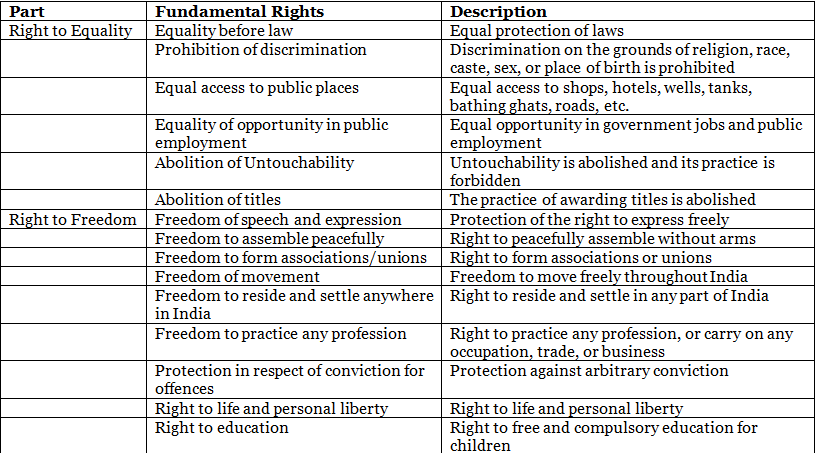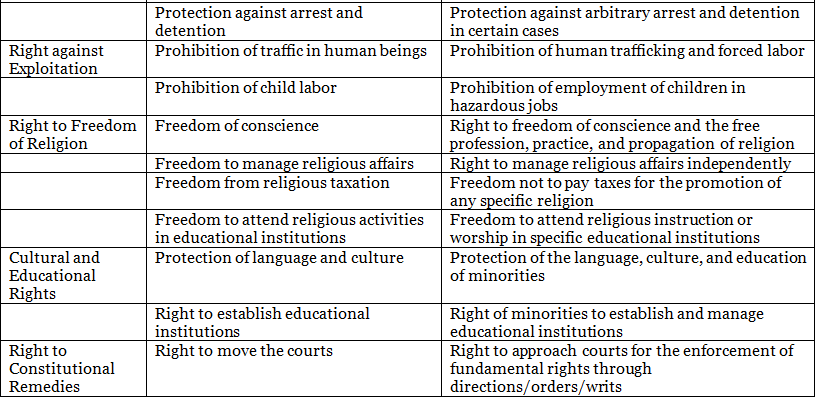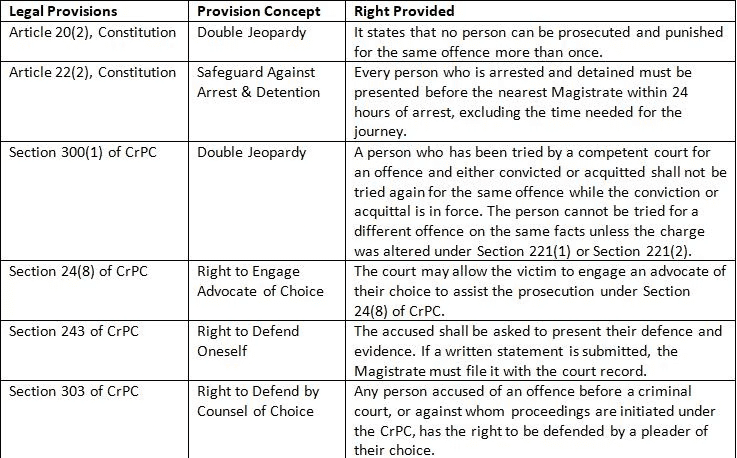CLAT Exam > CLAT Notes > Legal Reasoning for CLAT > Legal Current Affairs for CLAT (February 2024)
Legal Current Affairs for CLAT (February 2024) | Legal Reasoning for CLAT PDF Download
| Table of contents |

|
| 2023 Amendment to the IT Rules |

|
| Reproductive Health & Personal Liberty |

|
| Double Jeopardy |

|
| Right to Defend |

|
| Right to Fair Trial |

|
| Article 25 of the COI |

|
2023 Amendment to the IT Rules
Why in News?
Recently, the Bombay High Court, in the matter of Kunal Kamra v. Union of India & Connected Matters, held that the proposed Fact Check Unit under the 2023 amendment to the Information & Technology Rules, 2021, directly infringes fundamental rights guaranteed under Article 19(1)(g) of the Constitution of India, 1950 (COI), due to the differential treatment between online and print content.
Background of the Case
- A complaint was filed against the Central Government’s 2023 amendment to Rule 3(1)(b)(v) under the Information Technology (Intermediary Guidelines and Digital Media Ethics Code) Rules, 2021.
- Through this amendment, the Central Government appointed itself as the sole authority to determine what constitutes fake, false, or misleading content.
- The petitioners argued that the amendment establishing the proposed Fact Check Unit violated constitutional freedoms, particularly those under Article 19(1)(g) of the COI.
- Consequently, a petition was filed before the Bombay High Court, which later ruled in favor of the petitioners.
Court’s Observations
- Justice Patel observed that digital information does not become fake, false, or misleading solely because it exists in digital format.
- Social media has emerged as the primary medium for news dissemination over the past half-decade, with evidence of a decline in hard-copy newspaper readership and stagnation in advertising revenue.
- Social media, being a key driver of news dissemination, is disproportionately targeted by the amendment, while print media remains unaffected.
- The court emphasized that the impugned rule directly infringes Article 19(1)(g) of the COI, as it sidelines digital versions of reportage that the Central Government might disagree with.
Relevant Legal Provisions
Information Technology (Intermediary Guidelines and Digital Media Ethics Code) Rules, 2021
- The rules were notified on 25th February 2021 by the Union of India.
Amendments to Rule 3:
- Rule 3 is the contentious provision, amended in 2022 and 2023 (only the 2023 amendment is challenged).
- The amendment rationalized the grounds in subclause 1 of Rule 3 by removing the terms “defamatory” and “libellous.”
- The determination of whether content is defamatory or libellous is now subject to judicial review.
- Some content categories in subclause 1 of Rule 3 (Rule 3(1)(b)) have been rephrased to specifically address misinformation and content that could incite violence between religious or caste groups.
Article 19(1)(g) of the Constitution of India
- Article 19(1)(g) guarantees citizens the right to practice any profession or to carry on any occupation, trade, or business, subject to Article 19(6).
- Article 19(6) outlines the reasonable restrictions the state may impose on this right.
Reproductive Health & Personal Liberty
Why in News?
Recently, the Bombay High Court, in the case of XYZ & ABC v. Union of India, held that reproductive health is an integral aspect of personal liberty under Article 21 of the Constitution of India, 1950 (COI).
Background of XYZ & ABC v. Union of India Case
- The petitioners, a married couple, tied the knot on 29th April 2013.
- They argued that parenthood was unachievable due to severe medical conditions suffered by the wife, who underwent multiple surgeries between 2011 and 2023.
- The petitioners sought to opt for surrogacy as per the provisions of the Surrogacy (Regulation) Act, 2021, and the associated Rules.
- The Central Government amended Clause 1(d) of Form 2 under Rule 7 of the Surrogacy (Regulation) Rules, 2022, prohibiting donor gametes.
- The petitioners claimed this amendment was illegal as it contradicted the Surrogacy Act.
- Aggrieved by the amendment, the petitioners approached the Bombay High Court, which ruled in their favor.
Court’s Observations
- Justices G.S. Kulkarni and Firdosh Pooniwala emphasized that denying the petitioners the relief sought would prejudice their legal rights to parenthood through surrogacy.
- The Court reiterated that reproductive health is a fundamental aspect of personal liberty guaranteed under Article 21 of the COI.
Article 21 of the Constitution of India, 1950
About:
- Article 21 states that no person shall be deprived of his life or personal liberty except according to a procedure established by law.
- This right is available to all persons, including citizens and foreigners.
- The Supreme Court has termed this article as the "Heart of Fundamental Rights."
- The protection under Article 21 applies against actions of the State only.
- Article 21 ensures two key rights:
- Right to Life
- Right to Personal Liberty
Key Case Laws:
- Francis Coralie Mullin v. The Administrator (1981): Justice P. Bhagwati described Article 21 as embodying a constitutional value of utmost importance in a democratic society.
- Kharak Singh v. State of Uttar Pradesh (1963): The Supreme Court held that the term life implies more than mere physical existence, extending to all faculties and limbs that make life meaningful.
Surrogacy Laws
Surrogacy (Regulation) Act, 2021:
- Enforced on 25th January 2021.
- Allows surrogacy for a widow or a divorcee aged 35–45 years, or a legally married couple facing medical conditions necessitating surrogacy.
- Prohibits commercial surrogacy, punishable by up to 10 years of imprisonment and a fine of ₹10 lakh.
- Permits only altruistic surrogacy, where no monetary exchange occurs, and the surrogate mother must be genetically related to the intended parents.
Surrogacy (Regulation) Rules, 2022:
- Specifies the format, registration procedures, and fees for surrogacy clinics.
- Outlines the qualifications required for individuals working in registered surrogacy clinics.
Double Jeopardy
Why in News?
- Recently, the bench of Justice Krishna S Dixit and Justice G Basavaraj heard a case challenging the order of the Karnataka State Administrative Tribunal.
- The Karnataka High Court examined the matter in the case of P V Rudrappa v. State of Karnataka.
Background of the Case
- The petitioner, an employee dismissed on bribery charges, approached the High Court against the Karnataka State Administrative Tribunal’s decision dated 10th February 2020, which dismissed his application.
- Initially, the petitioner had challenged the dismissal order issued on 14th May 2019 in an Application of 2017.
- The petitioner’s counsel argued that the Tribunal failed to consider the petitioner’s acquittal in a related criminal trial, a significant oversight necessitating the High Court’s intervention.
The State countered the petition, asserting:
- A distinction exists between criminal trials and disciplinary proceedings.
- The disciplinary action taken was valid and justified.
- The Court’s scope of review is limited, and the petition should be dismissed accordingly.
Court’s Observations
The High Court noted:
- "In a way, this can be likened to the doctrine of double jeopardy, constitutionally enacted under Article 20(2) of the Constitution of India."
- This observation was made as the petitioner had already been acquitted, yet was subsequently terminated from service.
What is Double Jeopardy?
About:
- Double jeopardy is a legal principle that prevents an individual from being tried or punished twice for the same offence.
- This concept is recognized and protected under both the Constitution of India and the Code of Criminal Procedure, 1973 (CrPC).
Constitution of India:
- Article 20(2) of the Constitution states:
- "No person shall be prosecuted and punished for the same offence more than once."
- This provision safeguards individuals from arbitrary or excessive punishment by ensuring that no one is tried or punished twice for the same offence.
Criminal Procedure Code (CrPC):
- The CrPC, which governs criminal proceedings in India, incorporates the principle of double jeopardy under:
- Section 300, which states:
- A person who has been tried and convicted or acquitted of an offence cannot be tried again for the same offence.
Right to Defend
Why in News?
The Supreme Court, in the case of Rupashree H. R. v. The State of Karnataka & Ors., has recently affirmed that the right to defend oneself is a Fundamental Right under the Constitution of India, 1950 (COI).
Background of the Case: Rupashree H. R. v. The State of Karnataka & Ors.
- A writ petition was filed before the Supreme Court challenging a resolution passed by the Mysore Bar Association (Respondent) on 16th March 2019, which stated that no member of the Association would file a vakalatnama on behalf of the petitioner.
- This matter has been pending since 2019, and despite repeated notices, the respondent has failed to appear before the Court.
- The Supreme Court, allowing the petition, quashed the resolution.
Court’s Observations:
A bench comprising Justices Vikram Nath and Satish Chandra Sharma observed that:
- The right to defend oneself is a Fundamental Right under Part III of the COI.
- The right to appear for a client is also a Fundamental Right, as it is a part of carrying on one’s profession as a lawyer.
What are Fundamental Rights?
About:
- Fundamental Rights are enshrined in Part III of the COI from Articles 12 to 35.
- Part III is often referred to as the Magna Carta of India.
- Magna Carta, issued by King John of England in 1215, was the first written document concerning the rights of citizens.
- These rights are inspired by the Bill of Rights in the US Constitution.
- Fundamental Rights are so termed because:
- They are essential for all-round development—material, intellectual, moral, and spiritual.
- They are guaranteed by the Constitution to all citizens of India without discrimination.
- Initially, the Constitution provided seven Fundamental Rights. However, the right to property was removed from this list through the 44th Amendment Act, 1978 and is now a legal right under Article 300-A in Part XII of the COI.


At present, there are six Fundamental Rights, which are as follows:
- Right to Equality (Articles 14–18)
- Right to Freedom (Articles 19–22)
- Right Against Exploitation (Articles 23–24)
- Right to Freedom of Religion (Articles 25–28)
- Cultural and Educational Rights (Articles 29–30)
- Right to Constitutional Remedies (Article 32)
Features of Fundamental Rights
- Some Fundamental Rights are available only to citizens, while others are available to all individuals, including citizens, foreigners, and legal entities such as corporations or companies.
- They are not absolute but subject to qualifications; the State can impose reasonable restrictions on them.
- Fundamental Rights protect individuals against arbitrary actions by the State. Additionally, some rights are enforceable against private individuals as well.
- These rights are justiciable, meaning individuals can approach the courts for their enforcement in case of violation.
- They are guaranteed and defended by the Supreme Court.
- During a National Emergency, the enforcement of Fundamental Rights may be suspended, except for the rights guaranteed under Articles 20 and 21.
Case Law
- In the landmark case of Kesavananda Bharati v. State of Kerala (1973), the Supreme Court ruled that while Parliament has the authority to amend Fundamental Rights, such amendments must not violate the basic structure of the Constitution.
Right to Fair Trial
Why in News?
Recently, a single-judge bench of Justice Harpreet Singh Brar held that the right to a fair trial is not confined to the accused but also extends to the victim and society.
What was the Background of the Case?
- The victim contended that the Investigating Officer was not conducting a fair investigation.
- She sought the involvement of a special investigation agency to ensure impartial investigation.
What was the Court’s Observation?
- The Punjab and Haryana High Court noted that in modern times, emphasis is predominantly placed on ensuring a fair investigation and trial for the accused, with insufficient attention to the victim and society.
- The court emphasized that it holds the onerous duty of striking a balance to ensure fair investigation and trial for the accused while safeguarding the interests of the victim and society.
What is the Right to a Fair Trial?
About:
- Fair trials uphold justice and maintain societal integrity.
- In the absence of fair trials, wrongful convictions undermine trust in the justice system.
- Governments must uphold law and order while respecting civil liberties.
Landmark Cases:
Shyam Singh v. State of Rajasthan (1973):
- The court highlighted that the perception of bias in a trial is significant. It is not merely about determining the actual impact of bias on judgment but whether a litigant could reasonably fear that bias influenced the decision.
Zahira Habibullah Sheikh and ors. v. State of Gujarat (2006):
- The Supreme Court underscored the need for fair treatment of both the accused and victims, emphasizing fairness as a fundamental right in criminal trials.
Himanshu Singh Sabharwal v. State of M.P. and Ors (2008):
- The courts have the authority under relevant legal provisions to ensure fair trials and intervene when due process is compromised.


Article 25 of the COI
Why in the News?
Recently, in the case of S Gurumoorthi v. State, the Madras High Court held that the right to attend a funeral comes within the scope of Article 25 of the Constitution of India, 1950 (COI).
Background of the S Gurumoorthi v. State Case:
- The petitioner was arrested and remanded to judicial custody on 13th June 2023 for offences under the Narcotic Drugs and Psychotropic Substances Act, 1985.
- The petitioner's father passed away on 10th February 2024.
- The petitioner applied for interim bail to attend the funeral rites of his father.
- The High Court initially did not favor granting interim bail. However, the court was also considerate of the petitioner’s fundamental rights.
- The court acknowledged that even the deceased is entitled to a dignified burial, which should involve the participation of close relatives.
- Consequently, the Court directed the Superintendent of the Central Prison, Madurai, to make necessary arrangements for the petitioner to attend his father’s funeral.
Court’s Observations:
- Justice GR Swaminathan observed that prisoners, including under-trials, can invoke the right under Article 25 of the Constitution of India. The right to participate in the funeral ceremony of a parent, spouse, or child is encompassed within this right, though it is not absolute and can be subject to prevailing circumstances.
- The Court further clarified that Article 25 could be invoked by any individual, regardless of whether they are a free person or a prisoner. The court also noted that the petitioner, being a Hindu, had certain religious obligations to fulfill. In this case, there were no special circumstances justifying the denial of this right.
What is Article 25 of the COI?
About:
- Article 25 guarantees freedom of conscience and the right to freely profess, practice, and propagate religion. It states:
- (1) Subject to public order, morality, health, and other provisions of this Part, all persons are equally entitled to freedom of conscience and the right to freely profess, practice, and propagate religion.
- (2) Nothing in this article shall affect the operation of any existing law or prevent the State from making laws:
- (a) Regulating or restricting economic, financial, political, or other secular activities associated with religious practice.
- (b) Providing for social welfare and reform or opening Hindu religious institutions of a public character to all classes and sections of Hindus.
Explanations:
- Explanation I: The wearing and carrying of kirpans are considered part of the Sikh religion.
- Explanation II: In sub-clause (b) of clause (2), the term “Hindus” includes those professing Sikh, Jaina, or Buddhist religions, and Hindu religious institutions are deemed to include institutions open to these religions.
Scope:
- Article 25 covers not only religious beliefs but also religious practices.
- These rights are available to all persons—both citizens and non-citizens.
Case Law:
- In Commr. HRE v. Sri L.T. Swamiar of Sri Shirur Mutt (1954), the Supreme Court stated that Article 25 ensures that every person has the freedom to hold religious beliefs according to their judgment and conscience and to express those beliefs through acts they deem appropriate. It also includes the right to propagate religious ideas for the benefit of others.
The document Legal Current Affairs for CLAT (February 2024) | Legal Reasoning for CLAT is a part of the CLAT Course Legal Reasoning for CLAT.
All you need of CLAT at this link: CLAT
|
63 videos|175 docs|37 tests
|
Related Searches















